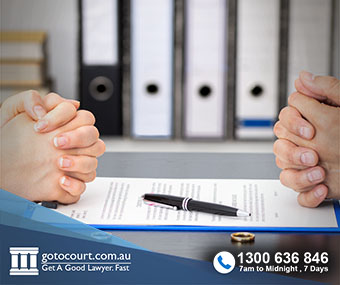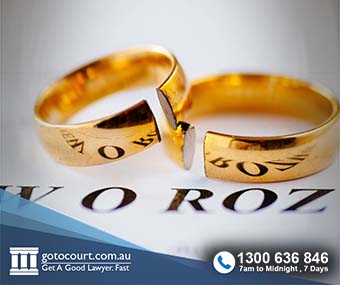Call our lawyers
now
or,
have our lawyers
call you
Divorce Hearings
Updated on Jan 04, 2023 • 5 min read • 959 views • Copy Link
Divorce Hearings
When someone files for divorce in Australia, there must be a hearing before the Federal Circuit and Family Court of Australia. The only purpose of the hearing is to determine whether the legal requirements for granting a divorce have been met. If the requirements have been met, then the divorce will be granted. This page looks at what happens during a divorce hearing in Australia.
Divorce hearings in Australia
Typically, it is a court registrar, rather than a judge, who presides over the divorce hearing. The only matter that is considered during the hearing is whether to grant the divorce. The court will not consider who was in the wrong in a marriage. Also, during the divorce hearing, the court will not consider any matters in relation to the division of property, child support, spousal maintenance, or the parenting of children. However, if there are children under 18 and the parties do not make a joint application, the court will satisfy itself that the care of the children has been considered.
The registrar determines whether to grant the divorce based solely on the fulfilment of the statutory requirements.
These requirements are simple:
- The marriage itself must be legal and recognised in Australia;
- At least one spouse must be an Australian citizen, or live in Australia and consider Australia to be their home; and
- The couple must have been separated for at least 12 months.
A registrar can typically confirm these requirements through the documents submitted in the application, such as the marriage certificate or affidavits. As a result, the hearing itself is usually over in minutes, provided that the registrar is satisfied that all divorce requirements have been met.
Attending a hearing
A date for a divorce hearing is set when an Application for Divorce is filed with the court via the Commonwealth Courts Portal. An appropriate date can be selected from available dates shown on an online court calendar.
Divorce hearings are typically held electronically. However, all courtroom procedures and rules of decorum still apply. Parties should be courteous and polite to the registrar and all other parties present at the hearing. Anyone who attends a divorce hearing should be prepared and have copies of all relevant documentation on hand (including their Application for Divorce form, service documents and any supporting evidence).
Who needs to attend a divorce hearing?
When the parties have jointly lodged the application and neither spouse objects to the hearing being held in their absence, there is no need for either party to attend the divorce hearing. By contrast, a sole applicant with a child under 18 is required to attend the hearing so the registrar can confirm that care arrangements are in place for the child. A sole applicant also needs to attend if they have not been able to properly serve their spouse with the divorce papers.
Who should attend a divorce hearing?
If a person has provided affidavit evidence as part of their Divorce Application (or Response), it is advisable to attend the divorce hearing in case the court wishes to seek clarification.
For instance, a party should usually attend the divorce hearing if:
- the couple was living separately under the same roof during their statutory separation period;
- the couple was married for less than two years, and no counselling certificate has been provided; or
- a situation has changed since the divorce application was filed, and the court needs to be informed of the change.
Failure to attend a divorce hearing
If someone is required to attend the divorce hearing but is unable to be present at a particular time and place, they can seek an adjournment of the hearing. The individual can request the adjournment by email to the court, explaining the need for the adjournment.
Under the Federal Circuit and Family Court of Australia Family Law Rules 2021, if a party fails to attend a required court event, the other party can proceed as if the Application for Divorce or Response to Divorce was undefended. However, if both parties fail to attend the hearing, the registrar is empowered to dismiss the Application for Divorce and/or the Response to Divorce.
After the divorce hearing
In rare cases, the court is not satisfied with the evidence presented at the hearing and will not grant a divorce. For instance, the court may require additional proof of the date of separation, particularly if there is a disagreement over the date between the parties themselves. In most cases, however, the court will grant an order of divorce at the hearing. The divorce order becomes permanent after a further delay of one month and one day from the hearing date.
Obtaining a copy of the divorce order
The divorce order is available to download from the Commonwealth Courts Portal the next working day after the order becomes final. The divorce order has an electronic seal and signature. This is the only official record of divorce that the court issues, and no hard copy certificate is posted to the parties. Once the order has been stamped and sealed, the divorce is final, and the parties are no longer legally married. At this stage, the former spouses are free to remarry.
Go To Court Lawyers can answer any questions about divorce hearings and even attend a divorce hearing on your behalf. Please get in touch with our Family Law specialists on 1300 636 846 for any legal assistance.

Affordable Lawyers
Our Go To Court Lawyers will assist you in all areas of law. We specialise in providing legal advice urgently – at the time when you need it most. If you need a lawyer right now, today, we can help you – no matter where you are in Australia.How It Works







1. You speak directly to a lawyer
When you call the Go To Court Legal Hotline, you will be connected directly to a lawyer, every time.


2. Get your legal situation assessed
We determine the best way forward in your legal matter, free of charge. If you want to go ahead and book a face-to-face appointment, we will connect you with a specialist in your local area.


3. We arrange everything as needed
If you want to go ahead and book a fact-to-face appointment, we will connect you with a specialist in your local area no matter where you are and even at very short notice.

















